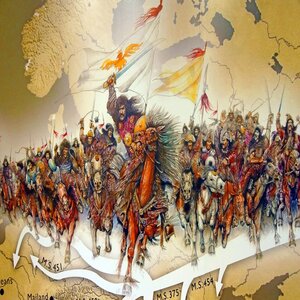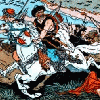
Huns
CBUB Wins: 0
CBUB Losses: 1
CBUB Ties: 0
Win Percentage: 0%
Added by: CrinosVegeta
Read more about Huns at: Wikipedia
Official Site: Public Domain
The Huns were a group of nomadic pastoral people who, appearing from beyond the Volga, migrated into Europe c. AD 370 and built up an enormous empire in Europe. Since De Guignes linked them with the Xiongnu who had been northern neighbours of China 300 years earlier to the emergence of Huns, considerable scholarly effort has been devoted in investigating such a connection. However, there is no evidence for a direct connection between the dominant element of the Xiongnu and that of the Huns. A contemporary mentions that the Huns had a language of their own; very little of it has survived and its relationships have been the subject of debate for centuries. According to some theories, it was a Turkic language. Numerous other languages were spoken within the Hun pax including East Germanic. Their main military technique was mounted archer.
The Huns may have stimulated the Great Migration, a contributing factor in the collapse of the western Roman Empire. They formed a unified empire under Attila the Hun, who died in 453; their empire broke up the next year. Their descendants, or successors with similar names, are recorded by neighbouring populations to the south, east, and west as having occupied parts of Eastern Europe and Central Asia roughly from the 4th century to the 6th century. Variants of the Hun name are recorded in the Caucasus until the early 8th century.
All surviving accounts were written by enemies of the Huns, and none describe the Huns as attractive either morally or in appearance.
:"They made their foes flee in horror because their swarthy aspect was fearful, and they had, if I may call it so, a sort of shapeless lump, not a head, with pin-holes rather than eyes. Their hardihood is evident in their wild appearance, and they are beings who are cruel to their children on the very day they are born. For they cut the cheeks of the males with a sword, so that before they receive the nourishment of milk they must learn to endure wounds. Hence they grow old beardless and their young men are without comeliness, because a face furrowed by the sword spoils by its scars the natural beauty of a beard. They are short in stature, quick in bodily movement, alert horsemen, broad shouldered, ready in the use of bow and arrow, and have firm-set necks which are ever erect in pride. Though they live in the form of men, they have the cruelty of wild beasts."
Images with a green border may be set as the character's main profile image (For images 200x200 or 300x300 pixels square).
CBUB Match Record:
| Result | Opponent | My Score | Their Score | |
|---|---|---|---|---|
| Loss | The Klingon Empire | 5 | to | 7 |
No Fantasy Draft Records Available

